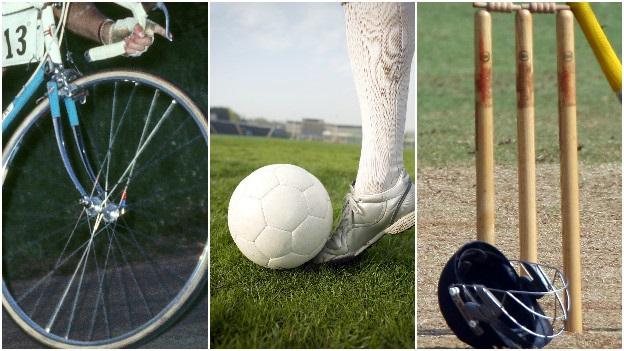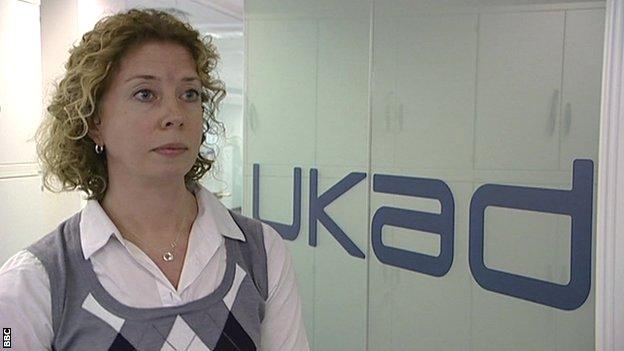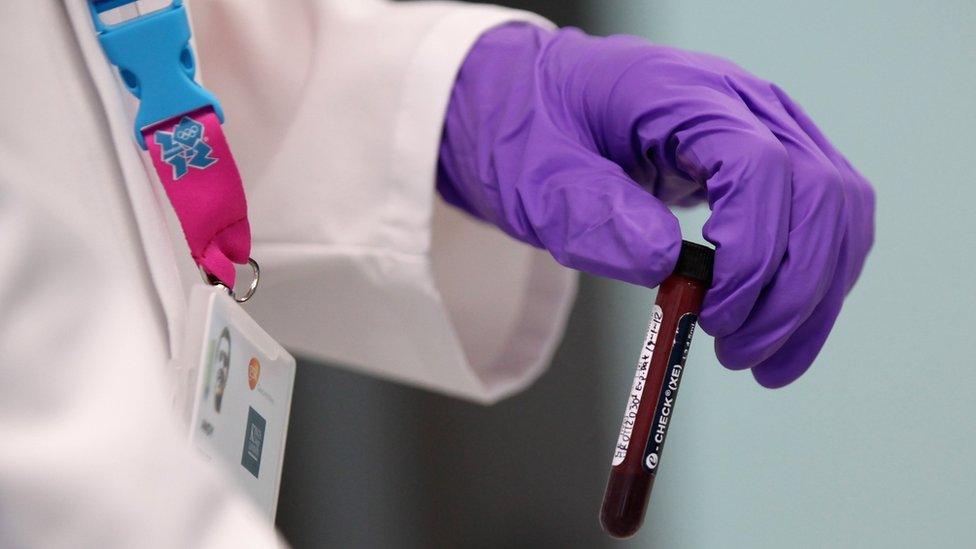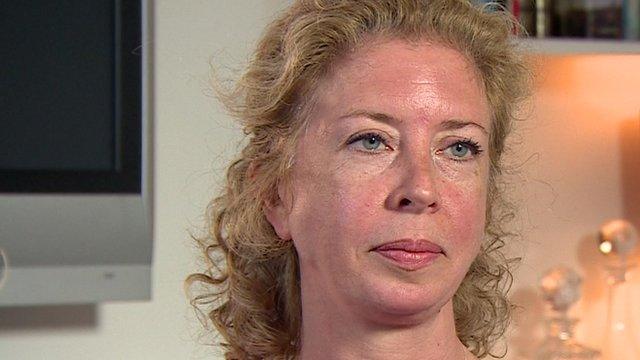Anti-doping: Government inquiry into Ukad's doctor probe
- Published

The government has ordered an inquiry into the UK Anti-Doping Agency (Ukad) over its handling of an investigation into alleged doping activities by a doctor involving Premier League footballers and other leading athletes.
According to a Sunday Times, external investigation, Mark Bonar - a London-based private doctor - charges sports stars thousands of pounds for drug programmes.
The newspaper says it has secretly filmed the medic claiming that he has prescribed performance-enhancing drugs such as EPO, steroids and human growth hormone to 150 elite sports professionals from the UK and abroad over the past six years, including:
several Premier League footballers
an England cricket international
British cyclists
tennis players
There is no suggestion that any Premier League clubs were aware of any alleged wrongdoing and the Sunday Times says it has no independent evidence Bonar treated the players.
Bonar has told the Sunday Times he treated the athletes for medical reasons and not to enhance their performance. There is no suggestion the substances were illegal.
Athletes contacted by the newspaper either denied Bonar had treated them or declined to comment.
The government investigation stems from claims made by a whistleblower athlete who was banned for breaching anti-doping rules in 2014.
According to the newspaper, the sportsman - who wishes to remain anonymous - approached Ukad with evidence that indicated Bonar had allegedly prescribed him performance-enhancing drugs.
Ukad says it did begin an investigation into Bonar but found that he was outside of its jurisdiction as he was not governed by a sport, and decided not to pass the case to the General Medical Council (GMC) or to contact him.
More on alleged doping in sport | |
|---|---|
The Sunday Times - in collaboration with an aspiring athlete - then secretly recorded Bonar allegedly prescribing a series of prohibited drugs to the runner. It is claimed that Bonar then went on to talk about the other sportspeople he says he treated.
Bonar does not currently hold a licence and is unable to practise medicine in the UK, according to the GMC.
He is also facing a misconduct tribunal, external later this month. It is unrelated to allegations of doping.
Ukad told the BBC it would conduct an independent review into the case.
'No room for complacency'
"I am shocked and deeply concerned by these allegations," Culture, Media and Sport Secretary John Whittingdale said in a statement.
"I have asked for there to be an urgent independent investigation into what action was taken when these allegations were first received and what more needs to be done to ensure that British sport remains clean.
"There is no room for complacency in the fight against doping and the government is already looking at whether existing legislation in this area goes far enough. If it becomes clear that stronger criminal sanctions are needed then we will not hesitate to act."
In response to the Sunday Times article, Ukad chief executive Nicole Sapstead said the organisation was "deeply concerned and shocked by the allegations".
Ukad's statement, external also said it had:
used the 'National Intelligence Model', external to assess all information that comes into its possession, "to avoid possible vexatious and spurious accusations"
been obliged to follow current legislation that gives Ukad power "only to investigate athletes and entourage (including medics) who are themselves governed by a sport"
commenced an investigation into Bonar following interviews with a sportsperson in April and May 2014. Ukad subsequently found there was nothing to indicate Bonar was governed by a sport
encouraged the sportsperson to "obtain evidence, to go through his files to see if he had any useful documents, to recall names, to keep in touch with investigators - anything which may be deemed as helpful to the investigation and could help to corroborate what had been said in his interviews"
recommended to the sportsperson that more information was needed and, since Bonar fell outside of Ukad's jurisdiction, that information could be passed if appropriate to the General Medical Council
received handwritten prescriptions in October 2014 which the sportsperson claimed to have been issued by Bonar. After assessing the evidence with an independent expert, Ukad "did not believe that there were grounds, at that point, to refer the case to the GMC"
World Anti-Doping Agency president Craig Reedie told the BBC it was "pretty dreadful news" and backed calls for an inquiry, but added: "It is best to wait for Ukad to do their own investigation, then we have full knowledge of the facts to work with.
"My own guess is if they had sufficient evidence then they would have acted."
Football "at risk" of doping?
Ukad, which receives around £7m funding each year, has been widely praised for its work in the fight against cheating in sport.
It has been helping Russia's anti-doping agency run testing programmes after Russia was banned from all athletics competitions following accusations of widespread doping. And it was recently appointed as the secretariat for an IOC taskforce that will oversee testing procedures at the Olympics.
Last year a study commissioned by Uefa suggested 7.7% of players in a sample of 879 had high testosterone levels, although European football's governing body said the figures "didn't present evidence of potential doping".
Earlier this year Sapstead told the BBC that football was "at risk" of doping problems.

Nicole Sapstead has worked in anti-doping since 1998 and joined Ukad in 2009
"When you're looking at a sport like football that commands the sort of salaries that the players can command, its fanbase, its ticket sales, its broadcasting rights - if that isn't a risk then I don't know what is, notwithstanding the physical demands of the sport itself," she said.
"Add that into a nice big mix and you've got everything pointing to a doping issue."
In response, the Football Association said Sapstead's comments were "speculative" and "unhelpful", adding that they had no "evidential basis".
A recent BBC Sport investigation learned that only eight drugs tests were conducted in Scottish football over a nine-month period between April and December 2015. There were 1,583 tests in English football over the same period.
Former Partick Thistle player Jordan McMillan is the only British footballer currently banned by Ukad, for taking cocaine.
- Published9 November 2015
- Attribution
- Published8 September 2015

- Attribution
- Published9 August 2015
